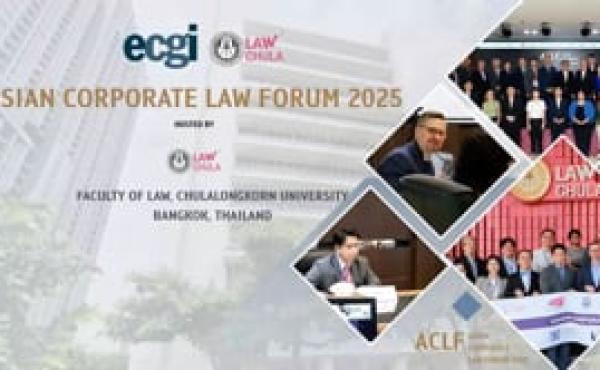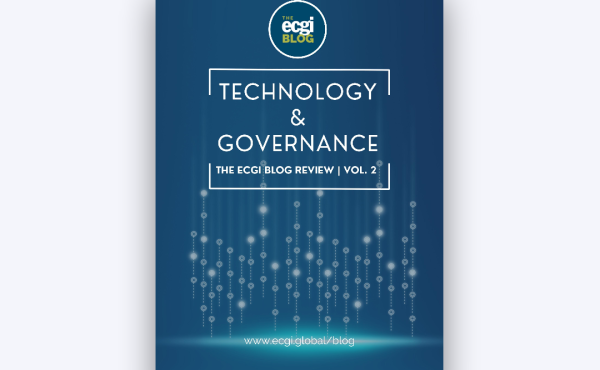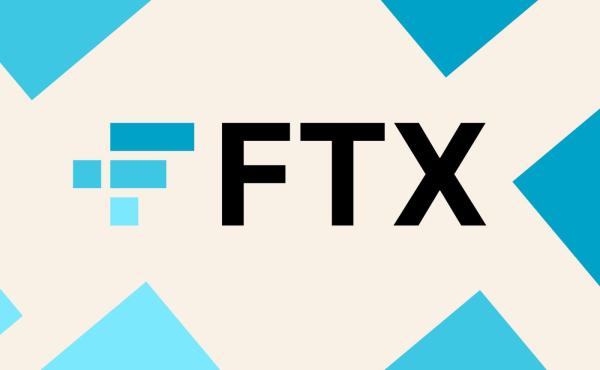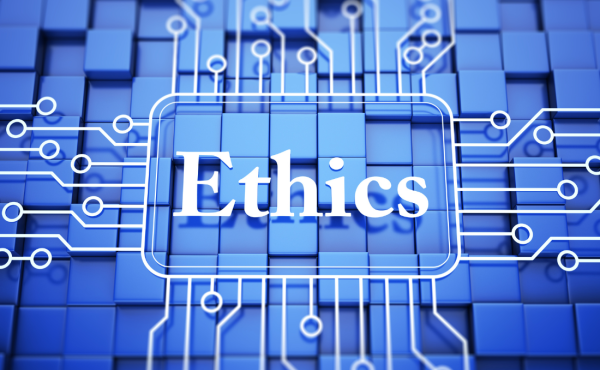Technology and Corporate Governance

Technology and Corporate Governance
Digital technologies and digital transformation is shifting the way our economy is functioning, our social relationships are structured and decision taking processes are shaped. Technological developments are also envisaging corporate organizations, currently highly centralized entities with formal and informal procedures and processes, often slowing decision taking processes and creating information asymmetries. Technology can drive change of corporations. This resource section relates to research and debate on the use of technology in corporate governance. A separate resource section exists for the governance of companies in the technology sector.
First, distributed ledger technology (DLT) and blockchains can ensure that the data is stored in a verifiable and immutable way, and there is no longer any need for an intermediary to establish trust between the company and shareholders. A permissioned distributed ledger can also constitute a set of rules for shareholder voting, including majority requirements and access rights, so that shareholders can exercise their rights in accordance with the applicable corporate law framework and the company’s articles of association. Blockchain technology can harmonize shareholder engagement opportunities by offering a common discussion platform for shareholders and board members. Decentralization can also affect the work of the corporate board. Ultimately a decentralized autonomous organization (DAO) is a governance system that work with smart contracts and could have the ability to take over (part of) the work of the centrally designated board.
Next, artificial intelligence (AI) is more and more used in different ways including artificial neural networks, fuzzy systems, evolutionary computing, intelligent agents and probabilistic reasoning models. These tools are helpful for the analysis of data trends, the provision of forecasts, the anticipation of users’ data needs, and so on. AI helps to make and shape the decision taking process and has the ability to support and even replace of human decision-making, particularly under conditions of uncertainty. It already resulted in the use of a robo-director Vital with a board observer status.
In November 2018 an ECGI Roundtable on technology and corporate governance centred on the use of technologies such as DLT and smart contracts, and artificial intelligence (AI) and machine learning, in the corporate governance context (/content/technology-and-corporate-governance). The roundtable identified many different relationships between companies and shareholders and showed that DLT offers opportunities for optimizing these relationships. Further it was shown that AI contributes the monitoring and synthesizing of information, risks, compliance etc. Second, AI is a helpful tool for simulations and scenario planning and the standard of care of directors can start to include an appreciation of the strength and weaknesses of AI tools.
All these developments clearly pose new questions, such as: Does blockchain have promise as a tool for registering ownership claims and the exercise of voting rights in listed corporations? What is the impact of AI and big data analysis on firms’ management and governance? Will smart contracts affect the boundaries between firms and markets in a number of industries? Could robo-directors be elected to the board?
ECGI will continue to track the progress of research in this area and related developments. Additional resources will be made available through these pages.
Queries should be directed to Prof. Christoph Van der Elst (Christoph.VanDerElst@UGent.be).
*****
Resources:
Academic papers:
Ferreira, Daniel and Li, Jin and Nikolowa, Radoslawa, Corporate Capture of Blockchain Governance (January 22, 2019). European Corporate Governance Institute (ECGI) - Finance Working Paper No. 593/2019. Available at SSRN: https://ssrn.com/abstract=3320437 or http://dx.doi.org/10.2139/ssrn.3320437
Armour, John and Enriques, Luca and Ezrachi, Ariel and Vella, John, Putting Technology to Good Use for Society: The Role of Corporate, Competition and Tax Law (November 20, 2018). European Corporate Governance Institute (ECGI) - Law Working Paper No. 427/2018. Available at SSRN: https://ssrn.com/abstract=3287696 or http://dx.doi.org/10.2139/ssrn.3287696
Fenwick, Mark and Vermeulen, Erik P.M., Technology and Corporate Governance: Blockchain, Crypto, and Artificial Intelligence (October 9, 2018). Lex Research Topics in Corporate Law & Economics Working Paper No. 2018-7; European Corporate Governance Institute (ECGI) - Law Working Paper No. 424/2018. Available at SSRN: https://ssrn.com/abstract=3263222 or http://dx.doi.org/10.2139/ssrn.3263222
Howell, Sabrina and Niessner, Marina and Yermack, David, Initial Coin Offerings: Financing Growth with Cryptocurrency Token Sales (August 30, 2018). European Corporate Governance Institute (ECGI) - Finance Working Paper No. 564/2018. Available at SSRN: https://ssrn.com/abstract=3201259 or http://dx.doi.org/10.2139/ssrn.3201259
Fenwick, Mark and McCahery, Joseph A. and Vermeulen, Erik P.M., The End of 'Corporate' Governance: Hello 'Platform' Governance (August 16, 2018). Lex Research Topics in Corporate Law & Economics Working Paper No. 2018-5; European Corporate Governance Institute (ECGI) - Law Working Paper No. 430/2018. Available at SSRN: https://ssrn.com/abstract=3232663 or http://dx.doi.org/10.2139/ssrn.3232663
Fenwick, Mark and Kaal, Wulf A. and Vermeulen, Erik P.M., Why 'Blockchain' Will Disrupt Corporate Organizations (August 7, 2018). Lex Research Topics in Corporate Law & Economics Working Paper No. 2018-3; U of St. Thomas (Minnesota) Legal Studies Research Paper No. 18-17 ; European Corporate Governance Institute (ECGI) - Law Working Paper No. 419/2018. Available at SSRN: https://ssrn.com/abstract=3227933 or http://dx.doi.org/10.2139/ssrn.3227933
Van der Elst, Christoph and Lafarre, Anne, Blockchain and Smart Contracting for the Shareholder Community (July 24, 2018). European Corporate Governance Institute (ECGI) - Law Working Paper No. 412/2018. Available at SSRN: https://ssrn.com/abstract=3219146 or http://dx.doi.org/10.2139/ssrn.3219146
Geis, George, Traceable shares and corporate law, Northwestern University Law Review 2018, 113, 227-278.
Lafarre, Anne and Van der Elst, Christoph, Blockchain Technology for Corporate Governance and Shareholder Activism (March 2018). European Corporate Governance Institute (ECGI) - Law Working Paper No. 390/2018; Tilburg Law School Research Paper No. 2018-7. Available at SSRN: https://ssrn.com/abstract=3135209 or http://dx.doi.org/10.2139/ssrn.3135209
Song, Wonnie, Bullish on Blockchain: Examining Delaware’s Approach to Distributed Ledger Technology in Corporate Governance Law and Beyond, Harvard Business Law Review Online 2017, 9-20, http://www.hblr.org/wp-content/uploads/2018/01/Bullish-on-Blockchain-Examining-Delaware%E2%80%99s-Approach-to-Distributed-Ledger-Technology-in-Corporate-Governance-Law-and-Beyond.pdf)
Möslein, Florian, Robots in the Boardroom: Artificial Intelligence and Corporate Law (September 15, 2017). in: Woodrow Barfield and Ugo Pagallo (eds), Research Handbook on the Law of Artificial Intelligence, Edward Elgar, (2018). Available at SSRN: https://ssrn.com/abstract=3037403 or http://dx.doi.org/10.2139/ssrn.3037403
Van der Elst, Christoph and Lafarre, Anne, Bringing the AGM to the 21st Century: Blockchain and Smart Contracting Tech for Shareholder Involvement (June 2017). European Corporate Governance Institute (ECGI) - Law Working Paper No. 358/2017. Available at SSRN: https://ssrn.com/abstract=2992804 or http://dx.doi.org/10.2139/ssrn.2992804
Yermack, David, Corporate Governance and Blockchains, Review of Finance, Volume 21, Issue 1, 1 March 2017, Pages 7–31, https://doi.org/10.1093/rof/rfw074
Bayern, Shawn J. and Burri, Thomas and Grant, Thomas D. and Häusermann, Daniel Markus and Möslein, Florian and Williams, Richard, Company Law and Autonomous Systems: A Blueprint for Lawyers, Entrepreneurs, and Regulators (October 10, 2016). 9 Hastings Science and Technology Law Journal 2 (Summer 2017) 135-162. Available at SSRN: https://ssrn.com/abstract=2850514 or http://dx.doi.org/10.2139/ssrn.2850514
Policy papers, reports, viewpoints and speeches:
Australian Securities Exchange, Chess Replacement, https://asxchessreplacement.atlassian.net/wiki/spaces/CSP/overview?mode=global
Bradley Fink, ‘Blockchain Comes To Corporate Governance With AST Proxy Voting’ [2017] at http://www.nasdaq.com/article/blockchain-comes-to-corporategovernance-with-ast-proxy-voting-cm791465
European Commission, FinTech Action plan: For a more competitive and innovative European financial sector, COM/2018/0109 final (https://eur-lex.europa.eu/legal-content/EN/TXT/?uri=CELEX:52018DC0109)
European Commission, Establishment of the EU Blockchain Observatory and Forum, https://ec.europa.eu/digital-single-market/en/news/european-commission-launches-eu-blockchain-observatory-and-forum
European Commission, European approach to artificial intelligence, https://ec.europa.eu/digital-single-market/en/artificial-intelligence
Blog posts:
Blogpost: The End of “Corporate” Governance: Hello “Platform” Governance (Harvard Law School Forum on Corporate Governance and Financial Regulation, March 6, 2019) Mark Fenwick (Kyushu University), Joseph A. McCahery (Tilburg University), and Erik P. M. Vermeulen (Tilburg University)
Blogpost: How Blockchain will Disrupt Corporate Organizations (Harvard Law School Forum on Corporate Governance and Financial Regulation, September 28, 2018) Mark Fenwick (Kyushu University), Wulf A. Kaal (University of St. Thomas), and Erik P. M. Vermeulen (Tilburg University)
Blogpost: Private Equity and Blockchain: New Infrastructure or New Asset Class? (Harvard Law School Forum on Corporate Governance and Financial Regulation, September 20, 2018) Andrew Moyle, Stuart Davis, and David Walker, Latham & Watkins LLP
Blogpost: Blockchain and Smart Contracting for the Shareholder Community (Harvard Law School Forum on Corporate Governance and Financial Regulation, September 6, 2018) Christoph Van der Elst (Tilburg University and Ghent University) and Anne Lafarre (Tilburg University)
Blogpost: Blockchain Technology for Corporate Governance and Shareholder Activism (Harvard Law School Forum on Corporate Governance and Financial Regulation, March 27, 2018) Anne Lafarre (Tilburg University) and Christoph Van der Elst (Tilburg University and Ghent University)
Blogpost: France’s Pioneering Blockchain Legal Framework for Unlisted Securities (The CLS Blue Sky Blog, January 29, 2018) Frédérick Lacroix, Sébastien Praicheux and Pierre d'Ormesson (Clifford Chance)
Blogpost: Delaware Blockchain Initiative: Revitalizing European Companies’ Funding Efforts (Harvard Law School Forum on Corporate Governance and Financial Regulation, September 21, 2017)
Blogpost: Blockchain and Smart Contracting Tech for Modern Shareholder Involvement (Oxford Business Law Blog, August 22, 2017) Christoph Van der Elst and Anne Lafarre (Tilburg University)
Blogpost: Corporate Governance for Complex Cryptocurrencies (Oxford Business Law Blog August 18, 2017) Philipp Hacker (European University Institute)
Blogpost: Delaware Law Amendments and the Maintenance of Corporate Records via Blockchain (Harvard Law School Forum on Corporate Governance and Financial Regulation, May 1, 2017) Allison L. Land and Edward P. Welch, Skadden, Arps, Slate, Meagher & Flom LLP
Blogpost: Delaware Share Ownership and the Blockchain (Harvard Law School Forum on Corporate Governance and Financial Regulation, June 24, 2016) Marco A. Santori, Pillsbury Winthrop Shaw Pittman LLP
Blogpost: Corporate Governance and Blockchains (Harvard Law School Forum on Corporate Governance and Financial Regulation, January 6, 2016) David Yermack, NYU Stern School of Business
****
Contact:
Prof. Christoph Van Der Elst





























































































